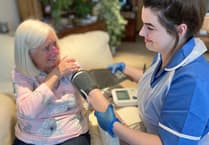A TRURO student with allergies is supporting a campaign encouraging educational establishments to give allergies more consideration.
Poppy Wintrip, 18, recently started a course at Guildford School of Acting. She was first diagnosed with food allergy at the age of three months old, and now lives with multiple severe food allergies.
Her mother, Rachael, said: “University is a time of excitement but also of concern - there's so much more for Poppy to consider than there would be if she didn't have allergies.”
Poppy’s journey through education has been one of anxiety and isolation. “Going back into secondary school after lockdown was very difficult - I was very frightened,” she recalls. “I wouldn't eat much because I feared I was going to have a reaction, and there was no support from the school.”
Rachael remembers giving primary school staff training in adrenaline auto-injectors: “Even with the school nurses, it wasn't in their remit at all.”
Poppy feels the psychological impact of allergy is not taken seriously enough. “It only got recognised as an issue when I stopped eating and started losing weight, and it became more of a physical issue.
“I would be up every single night having anxiety attacks, because I thought something would happen in my sleep. The anxiety stemmed from the isolation and the fear that everyday things most people eat pose a life-threatening risk to me.”
The National Allergy Strategy Group (NASG) - an alliance of professional allergy voices including British Society for Allergy and Clinical Immunology, Anaphylaxis UK and the Natasha Allergy Research Foundation - believes places of education are home to a greater number of allergy sufferers than ever before.
It is focusing on raising public awareness and producing targeted guidelines for schools and other educational departments to assist them in managing the healthcare needs of allergic students, including 61,000 in universities.
“Allergy amongst young people and students is at an all-time high, but there are significant gaps in the support they deserve,” said Professor Adam Fox. “It’s vital students know they are safe and supported as they navigate both their allergy and their education. Our mission is to raise allergy awareness, and to come together as a united front to tackle allergy with hundreds of UK experts.”
Dr Claudia Gore, a consultant in paediatric allergy at Imperial College Healthcare NHS Trust, London thinks students like Poppy need support during the transition to adult allergy healthcare services.
“At Poppy’s age, life is full of different transitions, from school to university or work, from home to living independently, new peers, having to manage health, finance and life independently,” says Dr Gore. “At few other times in life do we have to deal with that many changes at once.
“Additionally, they leave children’s services for adult care. Adult services tend to be more concise, with shorter appointment times focused on more in-depth detail.
“Young people need to be prepared, make sure they ask the questions they need to ask and not be intimidated. They have a right to be assessed for reasonable adjustments in education.”





Comments
This article has no comments yet. Be the first to leave a comment.